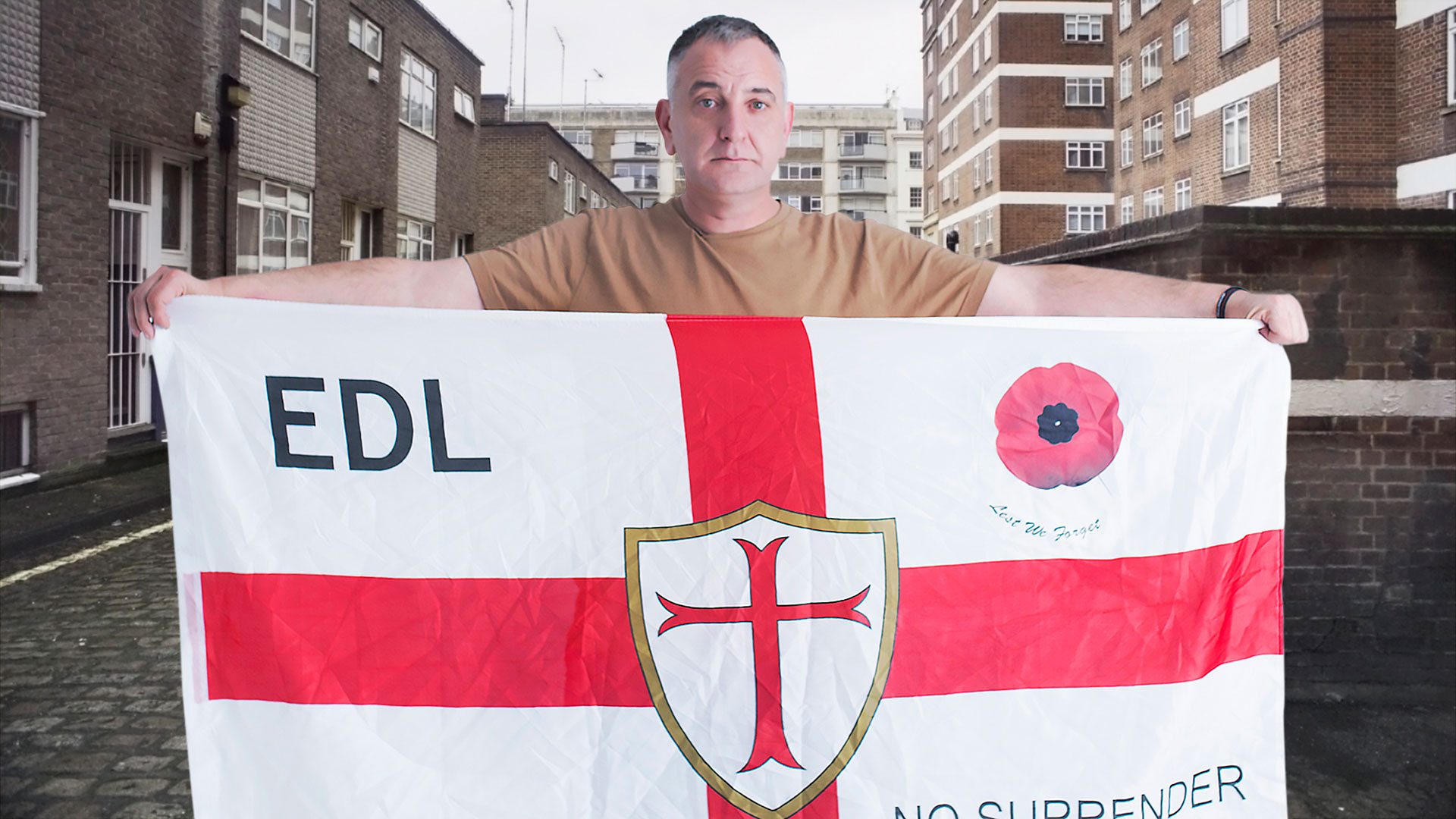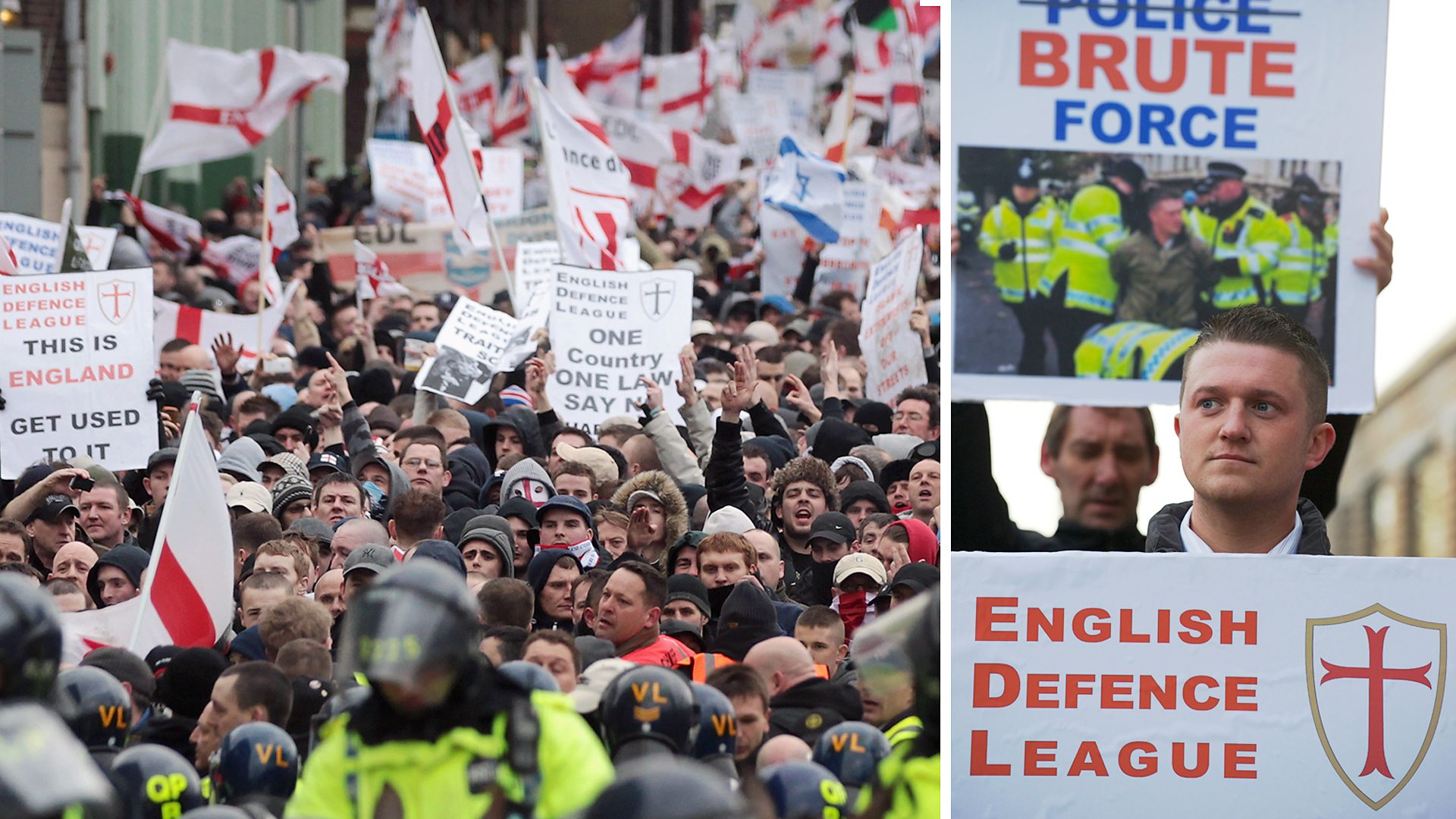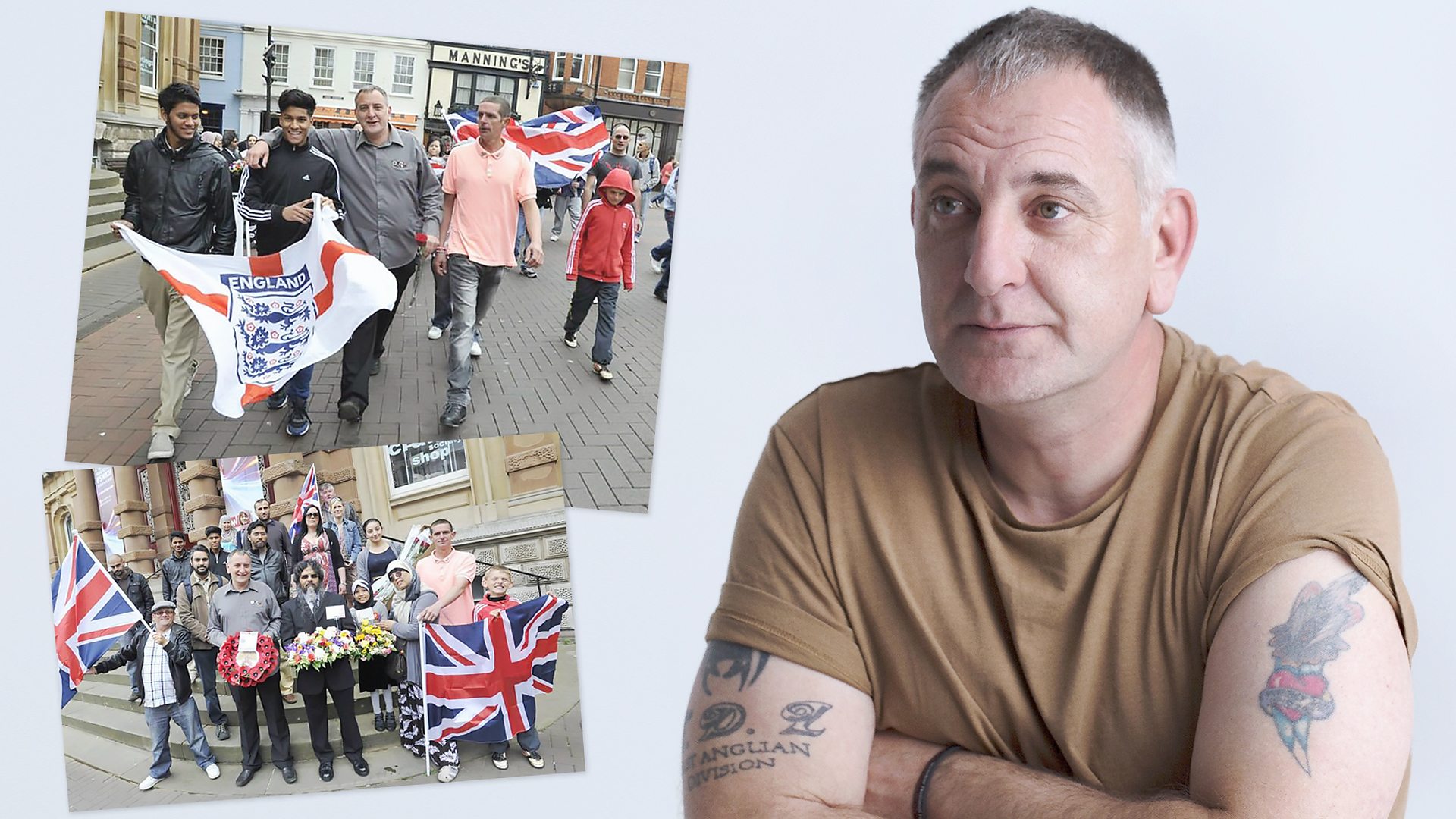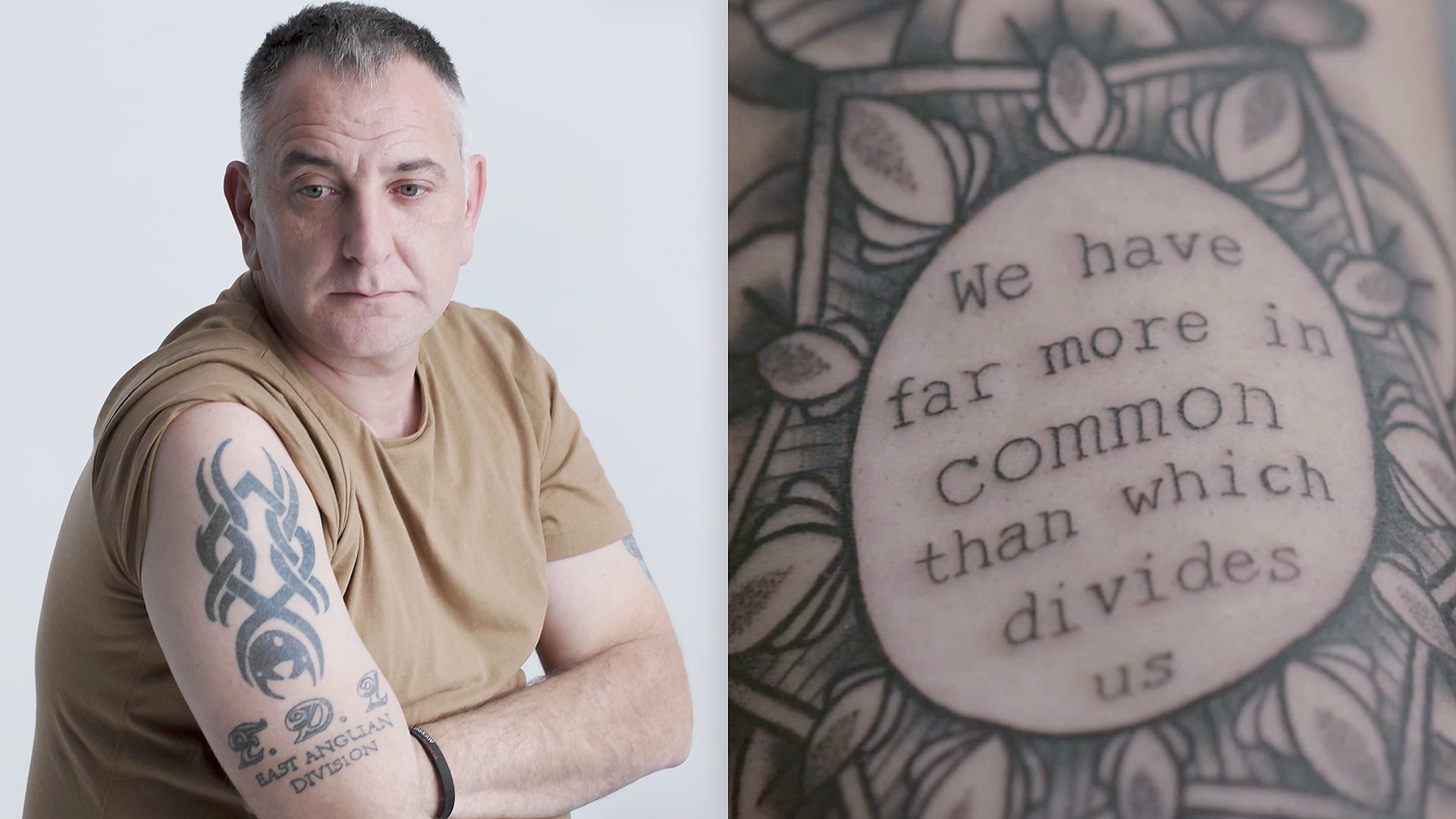I left the EDL after befriending an ex-jihadist

- Published
I realised we have far more in common than which divides us
ItÔÇÖs been three years since I left the English Defence League (EDL). I donÔÇÖt miss it, but I donÔÇÖt regret joining either. It made me who I am today.
Where I grew up, in Lowestoft, Suffolk, nearly everyone was white. Everything we knew about Muslims, we got from the newspapers. Often, the articles we saw were anti-Muslim. Maybe thatÔÇÖs what sells papers.
I left school in 1986, when I was 16. I got a job in a chicken factory, working long hours and burning myself out. In 1998, by then the father of two children, I had a nervous breakdown. The day they hospitalised me, my partner left meÔÇöI think IÔÇÖd been a nightmare to live with.
I was in hospital for 13 weeks and when I got out, things had changed. My friends started avoiding me, telling me I was a ÔÇ£psychoÔÇØ and a ÔÇ£nutterÔÇØ. I quit my job and became a bit of a recluse, and began struggling with depression.
While all my mates were down the pub, I was at home watching TV, cut off from people. My lifeline was online.
IÔÇÖd scroll through social media late at night, and thatÔÇÖs where, in 2009, I found the English Defence League (EDL). I was raising money with a friend for the British Army - we were doing it voluntarily - and had seen a Facebook video showing the hate preacher Anjem Choudary verbally attacking British troops. I wrote a comment expressing my anger and within 15 minutes, someone had sent me a message. We chatted for three hours about my fundraising work and why I posted my comment and he asked if I wanted to be an admin on the EDLÔÇÖs Facebook page. I said yes. I was just looking for somewhere to belong.

I began posting links to negative stories about Muslims and took part in my first demo a few months later. It was like I got addicted. Organising and attending the rallies became my drug of choice. YouÔÇÖve been speaking to all these people online and when you meet them, itÔÇÖs like youÔÇÖve known them all your life.
Before long, I met EDLÔÇÖs then leader, Tommy Robinson, and he ended up making me regional organiser for East Anglia. In TommyÔÇÖs book, Enemy of the State, he names me as a good friend, who always had his back.
People ask if I feel I was groomed by the EDL but thatÔÇÖs not how I see it. I had something in common with them, an anger and frustration at militant Islam. I felt like we had a shared purpose, of wanting to defeat it.
As the months passed, I got more and more involved with the EDL. The kids were both living with me by then, but I was basically ignoring them, spending every hour I had planning and organising. I ended up really believing that all Muslims are bad. The EDL became my full-time job, and I was on benefits to pay the bills. I know my dad didnÔÇÖt agree with me joining the group, but my family never tried to stop me.
A year in, though, something changed. In 2010, we held a demonstration against a mosque in Peterborough. In response, the Imams asked us for a meeting to discuss things. We didnÔÇÖt accept, but it was like a sea parted in my head.
I kept thinking, 'Why do these people who we stand against want to speak to us?' It nagged at me for a year. Eventually, I decided to act. I was out shopping with the kids when I saw some Muslim women go into a public library in Norwich. I followed them up there.
They went into this big room with about 60 other Muslims and I just went up and knocked on the window. This white guy came out and I told him I was EDL, and asked if we could perhaps have a chat. He agreed, saying that he had long wanted to speak to the EDL, but hadn't known how.

The next day we met for coffee. I was nervous and didn't know what to say, so we stuck to small talk. Over the next six months, though, we continued meeting and I talked to him about my negative views towards Islam. He helped me see that hating an entire religion was irrational.
In that same period, I met Manwar Ali, a former jihadist.
The EDL had heard rumours that Manwar had bought a church in Ipswich to convert to a super-mosque. We turned up to confront him and he told us weÔÇÖd got it wrong, it was going to be a community centre.
We began talking that day and despite our different backgrounds, I became good friends with Manwar, whoÔÇÖs about seven or eight years older than me. Getting to know him challenged my prejudices even more, and in the end we worked together on converting the church to a community centre.
In 2013, when my dad died of cancer, it was Manwar who I turned to, not the EDL.
When the soldier Lee Rigby was killed, Manwar and I arranged a joint march with some Muslims and members of the EDL in Lee's memory. A few newspapers covered it and I remember wishing that my dad had been alive to see it.
I stayed in the EDL for about 10 more months after that, but IÔÇÖd stopped enjoying it. I kept thinking about stuff Manwar and other Muslims had told me about the differences between Islam and militant Islam and the importance of not giving into hate. One day I realised, 'IÔÇÖm done.'
Leaving was tough. I got a lot of abuse and a few threats from other EDL members. People said I was a race traitor. Someone posted my address online and people threatened to come to my house and beat me up.

I didnÔÇÖt regret leaving the EDL but I missed the lads - that sense of brotherhood. I stayed in touch with some of them, but it wasnÔÇÖt the same.
In 2014, soon after I left, I decided to ring the Suffolk Hate Crime Service, which helps people who have experienced or witnessed hate crimes. They had often monitored the EDL, and I thought I could be of use, teaching people about why I joined the group.
They invited me to a workshop on radicalisation and thatÔÇÖs when my new life began.
Since then, IÔÇÖve spoken at hate crime vigils, given talks and ended up going viral in a video talking about my past. Now I work as an associate trainer with Me and You, an organisation which teaches people about extremism and radicalisation.
I last spoke to Tommy Robinson about eight months ago. WeÔÇÖre different people now, but it doesnÔÇÖt mean we canÔÇÖt be friends. I try and live by what Jo Cox said: ÔÇ£We are far more united and have far more in common with each other than things that divide us.ÔÇØ
And it's part of that phrase that I'm having tattooed on my left forearm: ÔÇ£We have far more in common than which divides usÔÇØ.
As told to Mirren Gidda
Ivan's story is part of new ┤¾¤¾┤½├¢ Three series A Tattoo To Change Your Life.